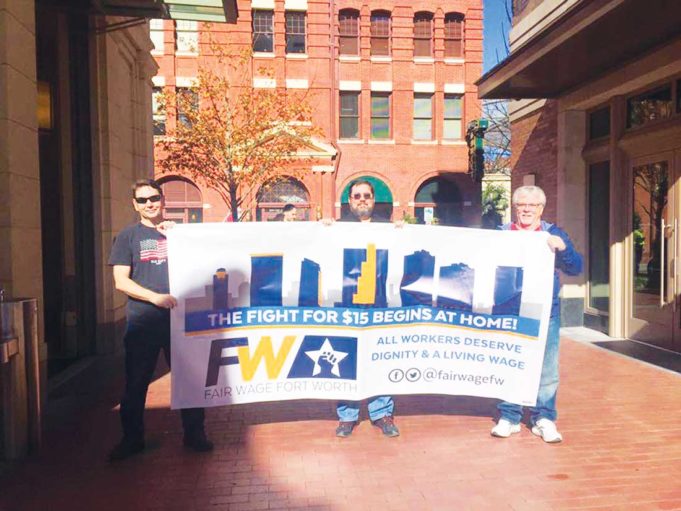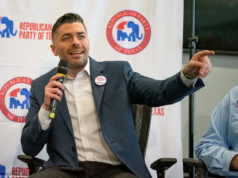Last month, the annual Martin Luther King Jr. Day Parade drew hundreds of marchers to Sundance Square. The event also drew several members of Fair Wage Fort Worth, a new volunteer group that is putting many of King’s calls into action.
“The parade was a great opportunity to let everyone know there is a force in Fort Worth that is working for fair wages like Martin Luther King Jr. did,” said Jason Smith, volunteer director of Fair Wage Fort Worth.
Smith noted that King was killed before the Poor People’s March on Washington, D.C.
Fair Wage Fort Worth’s goal, he said, is to raise the minimum wage for all workers in Tarrant County to $15 an hour. The group holds monthly meetings where guest speakers are invited to discuss topics related to how low wages and resulting poverty impacts the community. Smith is partnering with the nonprofit social justice group Cesar Chavez Committee of Tarrant County to bolster efforts to sway public officials at the city, the Fort Worth school district, and Tarrant County.
Cindy Vasquez, Fort Worth media coordinator, said there are 198 city employees earning between $7.25 and $10 an hour.
All 198 of them are part-time, she added.
The monthly take-home pay for a full-time worker earning the minimum wage of $7.25 an hour is $1,160. Smith said those numbers are unacceptable.
“We believe that if you work hard, you should get a fair day’s pay,” Smith said. “Wages in Fort Worth, like the rest of the nation, have been stagnant. We’ve held meetings with the city manager [about wage increases] that I believe were constructive.”
Fair Wage Fort Worth formed early last year in response to salary raises for city councilmembers (up to $45,000 from $24,000) and the mayor ($60,000 from $29,000). Smith used the pay hikes as an opportunity to ask city officials why they don’t also help city workers earning the minimum wage by speaking at city council meetings and spreading his message via social media. As an employment lawyer, Smith sees the societal problems that arise when workers aren’t paid fairly. Likeminded groups like the Cesar Chavez Committee and North Texas Jobs with Justice, a nonprofit focused on workers’ rights, saw Smith’s efforts as opportunity to collaborate.
Similar grassroots movements have spread across the United States in recent years. In 2015, Dallas City Council approved a $10.62 minimum wage for its employees and city contractors, up from $7.25. More recently, presidential candidate and Vermont Senator Bernie Sanders made “starvation wages” a central theme of his campaign.
City Manager David Cooke said in an email that there no full-time city employees earning less than $11 an hour. Effective October 1 of this year, the city’s pay schedule will be adjusted higher (up 2 percent for general government workers and up 5.9 percent for technology-related positions). The adjustment will result in pay increases for “more than 206 of the city’s lowest-paid employees.”
Robert Sturns, economic director for the city, said his department amended the city’s tax abatement policy last summer to incentivise contractors working with the city to offer their workers wages ranging from $13 to $20 an hour.
“The percentage of [lowered property tax] can rise based on the hourly wages being paid,” he said. “Any company would still have to meet several minimum thresholds to be eligible for incentives, including investment and job creation. However, city council is under no obligation to offer any incentives just because a firm may qualify for one under the policy. Each project is considered on its own merits.”
Among other places, Smith has spoken in front of Fort Worth school district trustees. Trustee Ashley Paz said the school district’s focus on teachers’ salaries has meant less time discussing employees at the bottom of the pay scale. According to school district records, 319 workers earn between $7.25 and $10 an hour.
“When we talk about setting academic goals, we can’t have that conversation without looking at our support staff and recognizing the role they play in student achievement,” she said. “We have to make sure they are earning a living wage. We are here to educate kids first and foremost. We also have to recognize the role [the support staff has] on the students’ lives every day. Making sure they are earning a living wage is a way to make sure they are invested in their jobs.”
Finding that money may not be easy. Late last year, Gov. Greg Abbott, Lt. Governor Dan Patrick, and House Speaker Joe Straus said state agencies should expect significant budget cuts.
Elsie Schiro, chief financial officer for the Fort Worth school district, said in an email that her department is bracing for significant budget cuts slated to go into effect next year.
“Cuts in state aid for public education would have a dramatic effect on the district’s budget, programs, and ability to provide cost of living increases to employees,” she said.
School district staffers, she added, are actively involved in supporting legislation that would increase, not cut, funding for schools.
“Funding is going to be an issue,” Paz said. “It’s not just an issue for fair wages. It’s an issue for anything we’re looking at.”
Alejandro Hukill, president of the Cesar Chavez Committee of Tarrant County, understands the financial constraints faced by the school district, but he said there’s never going to be an easy time to address this issue.
“One of the things we heard from our community is that we need to be active in the labor movement,” Hukill said. “The minimum wage issue was right there in front of our faces. We like to say we’re a city, but at the end of the day, we have these old, small-town traditions and policies that keep us from moving forward. Cities all across the nation are starting to raise the minimum wage, and we need to follow suit.”
Fair Wage Fort Worth and Caesar Chavez Committee volunteers plan to take a more active role in advocating for city and school board officials who support raising the minimum wage in Fort Worth.
Public officials, Hukill said, “need to understand that when they draft budgets, they need to address people making the minimum wage. We know there will be pushback, but we’re not going anywhere.”












